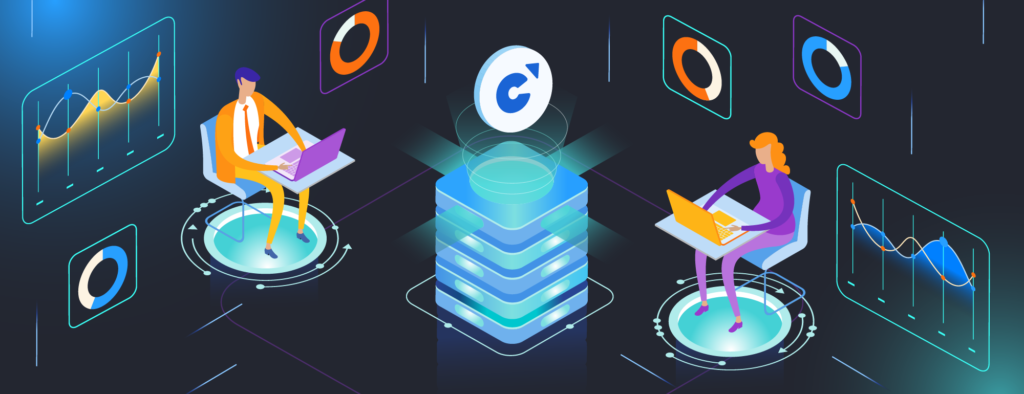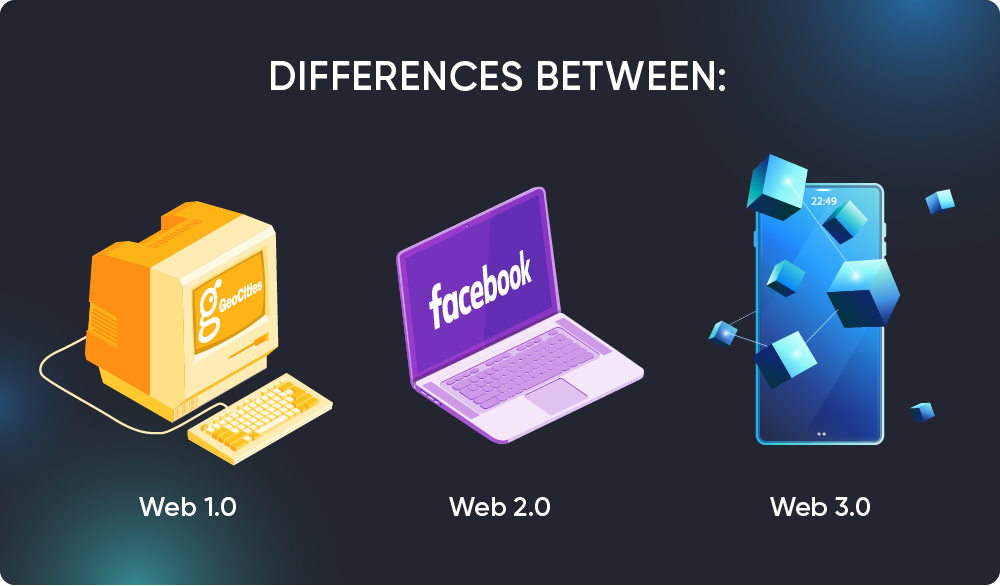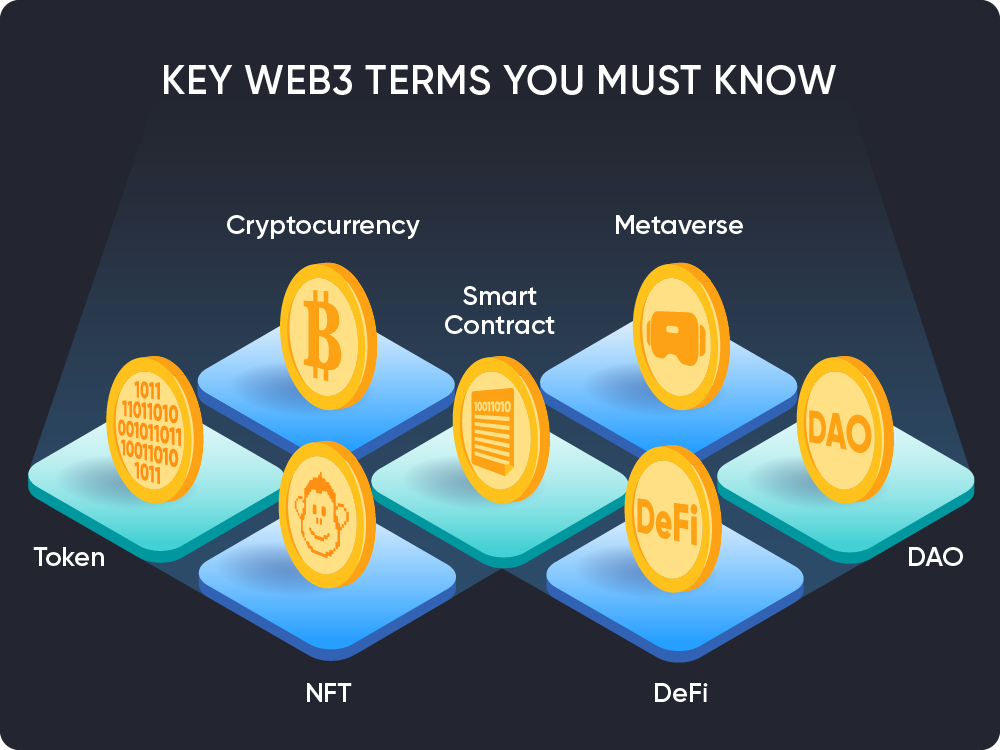What Is Web3: A Guide to the Next Technology Revolution

The internet world is changing, and it's impossible not to notice with terms like crypto, the metaverse, NFT's, and web3 popping up everywhere. But what do they mean? Is web3 the future of the internet?
Although we can't predict the future, we can surely help you understand it. So, we made this practical web3 guide, so you'll be able to understand what web3 is once and for all, plus all the key terms related to this imminent technology revolution.
Differences between web 1.0, web 2.0, and web 3.0

Web1.0 is the first generation of the internet in which the internet worked like an encyclopedia. You would go to a website and find a static page with content that you could read-only.
In Web2.0, social media joins the conversation. Now users can generate content; instead of only reading, you can now write by posting on Facebook and other platforms as an example.
In this stage, we are not only reading information from websites, but websites are collecting data from us. The problem with web 2.0 is that a few monopolies control the data. They mostly use it to target ads to consumers, bringing up issues like data privacy or censorship in social media. To solve these issues, web3.0 was born.
What is web3?
In web3 now, besides users being able to read and generate content, they get to own it and participate in the decisions, making the internet a more democratic place.
This open version of the web is what we call web 3.0, in which users would be able to exchange money and information on the web without the need for a middleman (like a bank or a tech company). Meaning people would have more control of their data and choose whether to sell it or not.
Another critical characteristic of web3 is decentralization. With decentralization, no one person or company has that kind of control. Instead of only one person or company having the power in a centralized version (web2), in web3, anyone can see the record and vote, like shareholders.
Web 3.0 has a significant relationship with gaming because people spend a lot of time creating things in gaming worlds. Still, they didn't own them and weren't compensated by them until technologies like blockchain were born.
Blockchain and Web3

What is blockchain?
Blockchain is a technology that allows a digital item to be verified as owned by a given person. In the blockchain, items have a particular code that cannot be changed; you can only add to it. This code works like a digital record of the history of that item.
Because you can prove ownership with blockchain, it can give you unique advantages.
Blockchain also allows people to create something original that people want to buy and sell to generate revenue. For example, in gaming, it could mean exclusive use of a weapon or access to a new private level. Also, they can be real-life benefits like access to a festival or concert.
Blockchain runs in decentralized data networks, meaning that several servers or computers are running simultaneously to ensure the selling or trading of data without losing ownership, risking privacy, or relying on intermediaries.
In actuality, there are thousands of blockchain nodes or computers in all places of the world running blockchain. Cryptocurrency was created to incentivize people to participate in blockchain with resources like computers.
In almost every blockchain, you get a reward for participating. That reward can be in the form of a cryptocurrency or a token.
Web3 Glossary: Key web3 terms you must know

Token: Piece of data that you own.
NFT: Stands for Non-Fungible Token, and it is a type of digital asset. An NFT is a token that you own that doesn't change throughout time. Non-fungible means that it can't be altered or split, and it must be original and distinguishable from others.
When you buy an NFT, you purchase the rights or the piece of data that lets you access that specific asset. In addition, some NFTs provide real-life benefits, like unique access to a band's concert.
Metaverse: It's an immersive virtual-reality space where users can play, socialize, compete, shop or even work.
It's related to web3 because all the web3 technologies like NFTs, blockchain, tokens, and cryptocurrencies would be essential for its development.
Smart Contract: Programs in a blockchain that run when the terms of the agreement are met. Like a regular contract that can automatically be executed. They are used for purposes like trading, investing, lending and borrowing.
DAO: It means Decentralized Autonomous Organization. A DAO is an organization run by code by a group of people who created it. DAOs are designed to reach a specific goal, and they are critical in the decentralization characteristic of web3.
A DAO functions similarly to a board meeting in the corporate world. In these meetings, shareholders of the company discuss and vote to make decisions for the company. Then the CEO makes sure those decisions are implemented.
In a DAO, there are no CEOs. Still, once the decision is made, the code is changed to change the entire company immediately. They also have shareholders that can vote to make decisions. In the crypto world, DAOs launch with a few thousand tokens. Every token is a vote and whoever holds the most tokens gets the larger amount of votes, just like a primary stakeholder in real life.
DeFi: Stands for Decentralized Finance. It refers to all the emerging financial technologies, infrastructure, and processes to democratize financial transactions. Build to replace traditional banks, institutions, and third parties that make financial services and products more expensive.
Cryptocurrency: A digital or virtual currency that uses cryptography to secure transactions, making it nearly impossible to counterfeit or double-spend. The most famous ones are Bitcoin and Ethereum.
Learn more about DeFi here.
Why does web3 matters? Is web3 the future?
We are seeing the boom of web3 now because the adoption of this technology is growing. More and more established and reputable companies are launching their web3 products like NFTs, like the Coca-Cola company.
The investment in these technologies continues to grow exponentially. As more companies and people continue to explore all the uses the blockchain and other web3 technology applications can be, we believe the opportunities are endless.
Experts on the subject believe that blockchain technology and what web3 provides will change radically three years from now. They claim that as this new technology becomes more regulated, it will not only be used in gaming, collectibles, and art, as we are already seeing. But it will be integrated with banking, real estate, medical records, etc.
How to get started with web3?
- Find people and projects leading the conversation on Twitter, Reddit, and Discord. These communities are filled with people sharing ideas and valuable information to help you learn.
- Follow related hashtags on Twitter, such as #NFT #NFTCommunity #Web3 #DeFi.
- Follow Chip on Twitter, Reddit, and Discord, stay tuned for the incredible news related to web3 and get ready to use this revolutionary technology applied to ecommerce.
We hope this web3 guide gives you a greater understanding of all the great technologies that web3 entails.
Don't forget to join Chip in our new web3 social media channels to be part of the next generation of ecommerce!
